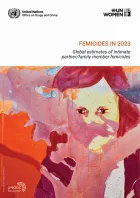1 - 14 of 14 Results
Date:
This report highlights some regions and countries of the world that have recorded a slight decrease in the number of femicides, hence contributing to global knowledge of how to effectively prevent femicides. The report reveals that the number of countries reporting on femicides has decreased by 50 per cent in the past five years.
Date:
Shelters serve as a crucial refuge for survivors of violence, offering both protection and essential support services. In Pakistan, however, their effectiveness, accessibility and quality remains limited due to a variety of socio-cultural, structural and institutional barriers. This needs assessment of state-run shelters from across the country seeks to understand the challenges confronting shelters, their staff and residents, and inform evidence-based strategies and programmes that can enhance the services provided.
Date:
At the United Nations Climate Change Conference (COP28), UN Women together with the Office of the COP28 President, UN High-Level Champion for Climate Change, UNFCCC, IUCN and WEDO, convened Counting on a sustainable future: A global conference on gender and environment data.
Date:
The finance maps work much like a dating site for women entrepreneurs and finance providers. First, you open the finance map for your country. Second, simply fill out your profile, filter on what you are looking for and the map will list the finance providers that best match your business.
Date:
The WE Rise Toolkit for Accelerators consists of three tools that provide actionable steps to unlock the power of gender inclusivity for your organisation and acceleration programme. This will enable entrepreneurs from all genders to benefit equally from the support you have to offer. To implement a more inclusive and innovative acceleration programme that yields business benefits for entrepreneurs and ecosystem partners, it’s advised to applying all of the three tools.
Date:
The WE Rise Toolkit for Entrepreneurs consists of four tools that provide actionable steps to unlock the power of gender inclusivity for your business. The WE Rise Toolkit is unique in the fact that it shows how gender equality means good business. You can use our four tools in an iterative manner. Once you’ve completed all four tools you can start over as to further sharpen your gender inclusive business.
Date:
A Regional Study of Interventions to Enhance Women and Girls’ Safety and Mobility in Public Spaces, Asia and the Pacific Region In public and private spaces, women and girls experience and fear various types of violence, ranging from harassment, to rape and femicide. Momentum is growing around the issue of women and girls’ safety in urban, public spaces. However, given that this is a relatively new field of work, published evidence of the impacts of such interventions remain.
Date:
Women and girls fear and experience various types of sexual violence in public spaces, from unwanted sexual remarks and touching to rape and femicide. It is a universal issue.
Date:
Sexual harassment and other forms of sexual violence in public spaces are an everyday occurrence for women and girls around the world—in urban and rural areas, in developed and developing countries.
Date:
The report specifically calls upon the Government of Afghanistan to acknowledge the commission of wartime atrocities, develop protection programs and support services for victims and witnesses of attacks against women, and foster an institutional culture in which women’s participation in the justice system, whether professionally or personally, is promoted and encouraged.
Date:
A new UN study on men’s use of violence against women was launched at the Foreign Correspondents’ Club of Thailand on 10 September 2013. The study of over 10,000 men in Asia and the Pacific found that nearly half of those men interviewed reported using physical or sexual violence against a female partner, ranging from 26 percent to 80 percent across the sites. Nearly a quarter of men interviewed reported perpetrating rape against a woman or girl, ranging from 10 percent to 62 percent across the sites.
Date:
This baseline study of UN Women’s anti-trafficking programme recognizes structural inequalities, vulnerabilities and lack of sustainable livelihoods as the chief causes of human trafficking.
Date:
The study examines how safe the two city areas are for women and girls and explores the relationship between women’s fear of violence and their avoidance of specific public spaces.
Date:
This scoping study, conducted by CMS Communication, aims to gain a deeper understanding of the nature of sexual violence and harassment in the selected areas of South Delhi to help refine the project design and determine the kinds of interventions required.



![[cover]](/sites/default/files/styles/search_image_140px/public/2023-12/ap-call-to-action-gender-environment-data-960px.jpg?itok=KUOWLy2p)










